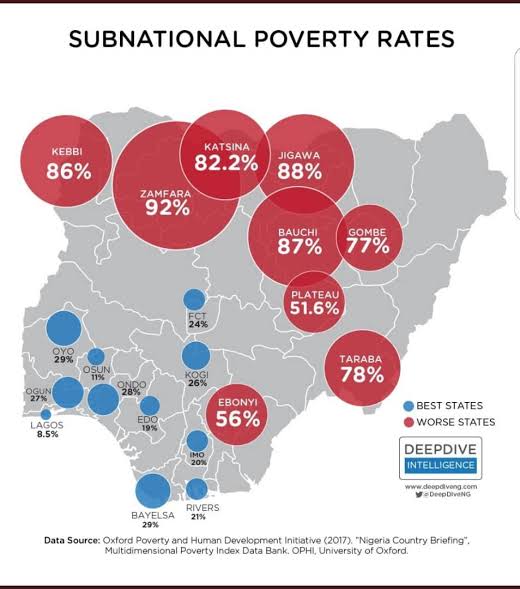
One hundred and thirty-three million Nigerians accounting for 63% of the population are poor.
This is contained in the 2022 Nigeria Multidimensional poverty Index, MPI report by the National Bureau of Statistics, NBS and launched by President Muhammadu Buhari, on Thursday in Abuja.
Multidimensional poverty measures the different types of deprivation suffered by the people in a given area.
The report focused on access to health, education, living standards, unemployment and security as well as child poverty.
President Buhari said the Multidimensional Poverty Index, MPI report was important especially as the global climate change, fuel scarcity, inflation and the Covid 19 pandemic have set back government’s poverty alleviation efforts.
He however reiterated the Federal Government’s commitment to lifting more Nigerians out of poverty despite the odds.
The President who was represented by his Chief of Staff, Prof Ibrahim Gambari urged governments at all levels to utilize the report as a policy document.
He added that the MPI would be integrated into the National Social Register- the government’s largest databank on the poor and vulnerable, and the Medium-Term National Development Plans (2021-2026 & 2026-2030) as a measurement and policy tool for poverty reduction.
The statistician General of the Federation and Chief Executive Officer of NBS, Prince Adeyemi Adeniran explained that two more dimensions were added to compute the 2022 MPI report.
‘’Unlike the Global MPI which uses 3 dimensions (Health, Education and Living Standards), we added a fourth dimension, Work and Shocks in the 2022 MPI Survey. This fourth dimension as well as other added variables such as food security, water reliability, underemployment, security shocks and school lag, were all added to reflect the current realities and priorities in Nigeria. The Survey also has a linked Child MPI. This Child MPI extends the Nigeria MPI to include appropriate indicators for children under 5, by adding a fifth dimension of child survival and development. This additional dimension contains eight vital aspects of early childhood development in physical and cognitive domains, including severe under nutrition, immunization, intellectually stimulating activities, and preschool’’, Prince Adeniran said.
Breaking down the report, the United Nations Resident and Humanitarian Coordinator in Nigeria, Matthias Schmale, maintained that poverty is more prevalent in the rural areas with 72% compared to the urban centres which was put at 42%.
He therefore stressed the need for governments to urgently tackle the challenge especially child poverty put at 83% for children below the age of five.
Also, the UNICEF representative Cristian Munduate pointed out that child MPI for all states was about 50% and the urgent need for intervention by increasing enrolment of out of school children.
Cristian appealed to the government not to fail the children as she narrated the story of some children who had suffered abuse and deprivations.
She pledged the funds commitment to supporting Government in its efforts to reduce poverty across the country.
The 2022 Nigeria Multidimensional poverty Index survey was a collaborative effort between the National Bureau of Statistics (NBS), the National Social Safety-Nets Coordinating Office (NASSCO), the United Nations Development Programme (UNDP), the United Nations Children’s Fund (UNICEF), and the Oxford Poverty and Human Development Initiative (OPHI).